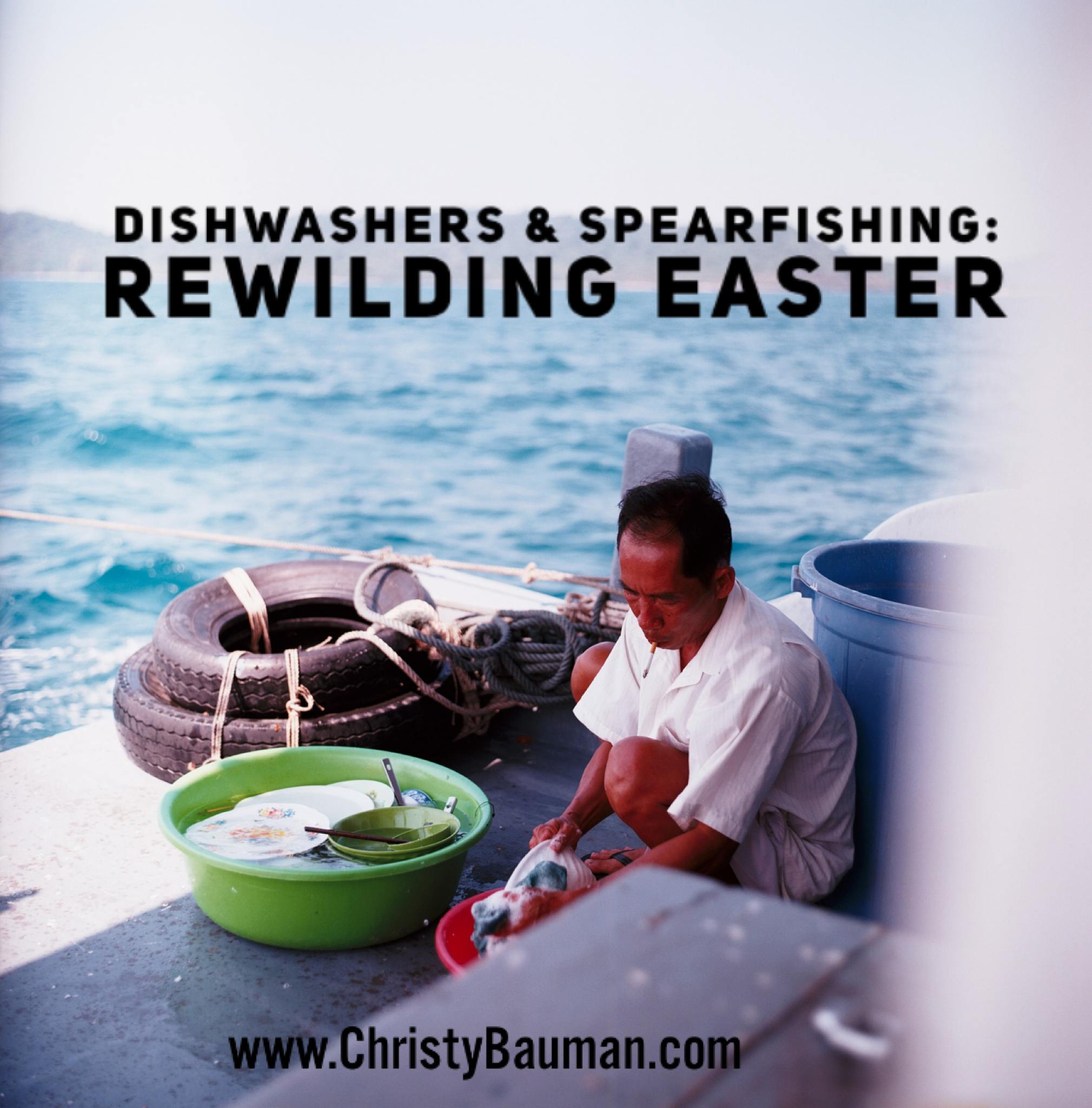
“The story of rewilding tells us
that change need not always
proceed in one direction.
It offers us hope that our silent spring
could be replaced by a raucous summer.”
– George Monbiot, Feral
I hate my dishwasher but most nights around 9:15 pm you can find me in the kitchen filling it up and setting it to clean all night while I sleep. Deep in the futility of housework and parenting comes the satisfaction that my dishwasher will be working for me while I sleep. I don’t like washing dishes for everyday mundane meals, smoothies crusted onto kids’ cups, hummus blobs left on a plate, or Mac and cheese dried on dishes left on the dinner table. Futility tries to swallow me up daily.
I have almost forgotten that dinnertime was my favorite meal to prepare when I am on the island, actually in truth dinner time was the only meal I would prepare for. At fifteen, long after my parents divorced, my time at my dad’s house was spent practicing Spanish and diving for dinner. If you want to know how to catch lobster and make conch ceviche, I will tell you now. It was mind-blowing to me that I could catch the most expensive meals in a restaurant. We would get on the boat around 11 every day, and without exception, the clear blue ocean would greet me with adventure. My body felt alive and exhilarated by the task of fishing for my dinner. I would practice reading the water and watching the sway of the coral to know which way the waves were moving much like an underwater weathervane.
Let me take a minute to explain coral reefs. A coral reef is the long strip of coral skeletons laid out across the ocean floor, imagine if you will a city of bones. They become the life source on the seafloor as fish and other sea creatures eat the organisms that collect on the coral. The type of fish and sea creatures you will see depend often on the vegetation type of coral. Angelfish, clownfish, barracuda and sea turtles are often tucked in different crevices of this city of bones. I have come to find that what sustains the ocean’s life are the old creatures, the crustaceans, such as shellfish and coral, these skeleton creatures that roam the deepest waters actually are the life source, holding plankton and other food available to keep the population of the ocean alive.
And when spearfishing, coral reefs are a compass when reading an ocean. So, as the boat cruised along with the crystal, clear waters, I would watch with intent where the coral reefs would break for a quarter mile or so, these areas leave barren patches of sand and these are the spots where the lobster’s traps are usually placed on the reef. My siblings and I would deliberate on which spot looked untouched as many local fishermen would fish near the traps. We would anchor the boat and load the speargun. This was a task I both loved and hated, pulling back this highly resistant gold rubber band to cock the spear in place could only be done against the strength of my thigh, usually leaving a bruise by the end of the day.
Once the anchor caught in the debris and sand of the ocean floor, the rocking of the boat would prove difficult for securing my flippers and loading my speargun. My brother and I would usually team up, we would sit on the opposite side of each other on the boat’s edge, secure our masks, and fall backward into the welcoming water. Once under the water’s cloak, we would swim to find rocks that might be hiding our sea crustaceans.
The secret to hunting lobster is readiness.
My brother or I would take turns unveiling the lobster’s hiding spots while the other would stand ready with the speargun. It is only a few seconds after you move the rock or debris that two or three lobsters might scurry out. The moment they were disturbed, the lobster would shoot backward across the sand bottom. The hunter would eye the largest one and shoot quickly. Because lobsters swim backward and so fast, you must aim your gun away from the area and shoot about three feet in behind the lobster’s swimming direction. It is only a matter of seconds to shoot once a lobster chooses which way to bolt out of a trap, and a hunter knows immediately when a lobster is hit. The underwater shrill of a wounded lobster is unmistakable and the hunter instantly knows they can pull the string attached to its spear, catch the flinching lobster in a netted bag and swim up to the boat. After a few hours of hunting these creatures in this repeated manner, we count our bootie and I offer to seine on the ride home to gather enough conch to make up for what lobster meat we could not secure. If there are fewer lobsters caught, it is easy to make up for the meal with conch meat. One drives the boat home while the other holds fast to the rope and seines the ocean floor for conch shells. Seining for conch is my favorite pastime, the boat slowly pulls me as I hang on to the rope being dragged through the water. The snorkel mask allows the fisher to watch for small hidden mounds on the ocean’s floor and dive down and retrieve a conch shell to their wrist-held mesh bag.
Once docked and tied at home, we gather and shuck the conch with a screwdriver and knife while another cleans the lobsters to grill. My body is exhausted from the hours of swimming, my sun-beaten skin is salty and I feel the soreness in my muscles as I chop the onions, tomatoes, and limes and hammer the conch meat. My siblings are all busy with the different tasks of cleaning food and preparing the meal. Music is playing, the conversation is full as we have spent most of the day surrounded by the silence of the ocean’s white noise. These are the meals I was created to make; this is the cooking that makes me come alive.
I do believe more than I ever have before that for something to live, something must die.
A few summers after I had learned how to spearfish lobsters, I got a job at Kroger grocery store in South Carolina – they put me in the seafood department because the manager heard I was from Louisiana and well versed in cleaning fish. My most hated order was the customer who wanted me to grab a lobster out of the glass tank and steam it. My thick plastic gloves, replacing my speargun, dug deep into that lobster tank and placed its rubber banded claws on a cold metal tray. I could still hear the unmistakable shrieking through the streamer’s walls when the heat hit forty-eight seconds. There was something excruciating about the death of domesticated lobsters. In all unabashed honesty, you must know that I would pray the sinner’s prayer over each one before I killed them.
Whereas, in the ocean, with my speargun, there was no mercy.
Somehow in my young brain, domesticated lobsters needed my mercy whereas wild ones needed my thirst.
Something must die for us to live, but it matters how it dies. Was it killed in freedom or captivity?
These are my favorite dinners, the ones that I caught with my hands and churned into sustenance. The hunter and gatherer in me can not find this same solace in ten years
of making Mac and cheese for my kids after a long day at work and then loading my dishwasher. It isn’t enough to sustain the wild but domesticated heart. On these nights after my kids are asleep and my kitchen is finally wiped down, I feel different exhaustion, the exhaustion of domestication. Although I am well aware that fantasy has a different cost and its own exhaustion, sometimes, I long for the days when my body felt full of sunshine and ocean rather than children’s longing hands and loud thoughts. We commit to rootedness in order to offer the rhythm needed for procreation but tucked inside of domestication is a grocery store aquarium of futility that requires more for me to flourish. Civility isn’t enough to sustain this wild but domesticated heart. The truth is that domestication is lazy-ier than the work of killing something wild.
I turn off the kitchen light, fill the dishwasher soap pods and my finger presses the button three times by habit…clean and soak cycle, high temp water, and delay 2 hours. I go to take my shower before the hot water is gone. These are my domesticated rhythms now.
The shower water reminds of the ocean water I so often miss, and my mind wonders what it will take to re-wild the futility I feel in domestication without drowning in fantasy. Working with clients around fantasy and futility, I have come to notice the nuances between the two – I am beginning to learn that resuscitation is different than resurrection. My community has helped me re-wild my heart but what does it look like to re-wild the domesticated soul? I don’t want to go back to my single life but I don’t want to be shackled in my domesticated one…with myself, my partner or God. I want to learn the art of resurrecting my soul.
There is a difference between recitation and resurrection.
At home and within my heart, I am learning the re-wilding of my faith…and I kindly whisper, this Easter is the anniversary of the morning our Savior was RESURRECTED not resuscitated. No one pressed upon His chest and gave Him back His old breath, Death did not resuscitate Him, the resurrection did. I want to press into that life, my life in which I am seeking for my futility and domesticated heart to be resurrected by this good life.
My dad called the other day, he had just gotten back from spearfishing, he told me that there is a weird phenomenon going on in the reef this past year, the coral is turning completely white, a bleaching that kills all the living organisms that feed on these ocean bones. On the mainland this happens often, a beetle takes the forest and it must be burned down to stop the spreading disease, the only way to save the forest is to burn it down and let the regrowth come back a few years later. But how do we do that underwater, how do we stop the bleach spreading across the coral in the reef?
Today, I know we are talking about re-wilding, not only ecologically, but spiritually, and nature’s answer to resilience is to almost kill whatever is diseased to keep it from completely dying. I believe this applies to my soul, a re-wilding and kind resurrection of myself, through the process of allowing what must die to be killed so that domesticated parts of my life can be resurrected.
On this Easter morning, I am beginning to learn that re-wilding is not only about how something is killed, but how something comes back to life.
“The story of re-wilding tells us that change need not always proceed in one direction. It offers us hope that our silent spring could be replaced by a raucous summer.”
– Feral: ReWilding the Land, the Sea, and Human by George Monbiot


